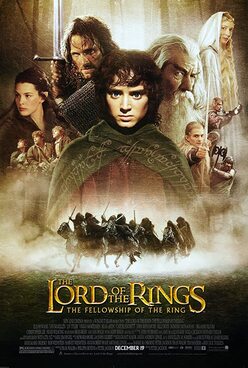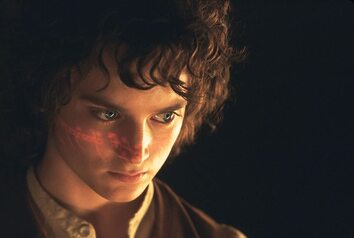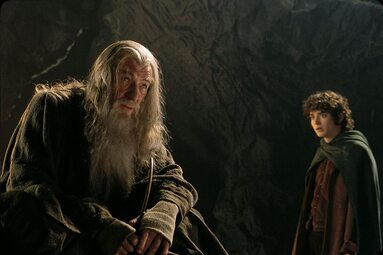
Frodo: I wish the ring had never come to me. I wish none of this had happened.
Gandalf: So do all who live to see such times. But that is not for them to decide. All we have to decide is what to do with the time that is given to us…
Unbelievably, 2021 will mark 20 years since Peter Jackson’s Oscar-winning The Lord of The Rings: The Fellowship of The Ring, debuted upon our silver screens. A fantasy epic quite unlike any other before it, Fellowship was not only a thrilling, technical marvel, but it also succeeded in delivering the first of three faithful adaptations of J. R. R. Tolkien’s beloved Lord of the Rings trilogy. On the surface, Fellowship (and the rest of the trilogy) perfectly embodies the archetypal tale of good vs. evil, similar to the Star Wars saga for instance. And, much like its Sci-Fi counterpart, Rings shares many a connection with key motifs of the Bible – particularly in regard to that of sin, faith and wisdom. Tolkien himself denied that his books were in fact an outright Christian allegory, but he admitted that God was certainly on his mind throughout his writing process, due to his background as a “devout Roman Catholic”. As a result of this, countless books and articles have been written to help Christians ‘find God’ in the Lord of The Rings, thereby enabling them to share the Good News with their friends. And he is indeed there – but out of all the most notable biblical connections throughout this film series, Fellowship’s embodiment of Christ shines through as the brightest.
Standing at an average height of three feet six inches, Hobbits aren’t naturally well-suited to the heroic archetype so critical to fantasy narratives - from Jason and the Argonauts to Harry Potter. For instance, Frodo himself isn’t at all interested in embarking upon the quest for the sake of adventure or saving a damsel in distress, but rather, he chooses to embrace the role of a hero in order that he might save the Shire (and by extension, Middle-earth) which he so loves. He is a meek, human-like creature of average build for a Hobbit, isn’t of any nobility or great social standing, but derives instead from humble beginnings. And yet, he was nonetheless chosen for a purpose. Perhaps if we were to have chosen the hero of The Lord of The Rings, from the many colourful characters which populate the sprawling narrative, we would be more likely to have chosen the warrior Aragorn (Viggo Mortensen) or the powerful wizard, Gandalf. But Frodo was chosen because of his growing willingness to sacrifice himself completely for the sake of the world and his love for it, which naturally draws us to compare Frodo to Christ – “No one has greater love than this, to lay down one’s life for one’s friends”, John 15:13 (NRSV). Yes, he is an ‘incomplete’ Christ figure, in that he eventually allows himself to fall prey to the schemes of Middle-earth’s very own Devil, Sauron. However, Frodo makes the initial, conscious decision to submit his will to that of the one who sent him, despite the realisation that taking the Ring to Mordor would almost certainly lead to his own death - destroying first his mind, soul and then his physical body.
Those present within the council meeting, turn to face Frodo in complete shock. To nominate the ‘halfling’ as the one who will destroy the One Ring, is preposterous to them who are men of worldly mind. And yet, both in spite of him and because of him, Frodo is later revealed to be the only one who could take the ring to Mordor, thereby accomplishing this impossible task. It is his purely noble reason for taking this difficult task upon himself (love), which allows him to succeed in the long run. But think of those who would have prevented him from embarking upon such a quest - not only would they perish, but their entire world around them would also. Such characters remind me of the Jews and Gentiles to whom Paul refers in 1 Corinthians 1:23-25 (NIV):
Why not prayerfully invite a friend or family member who doesn’t yet know Jesus, to watch The Lord of The Rings: The Fellowship of The Ring for themselves? Use the film’s themes to ask them what they thought of the film, if they spotted any links to Christianity and what they might think of the Gospel’s response to this subject.
If you feel able to, ask them what they think about Frodo taking on the role of saviour throughout The Fellowship of The Ring. Which qualities do they see in Frodo? Is he a perfect saviour/hero? Ask them what they think about the author/filmmaker's choice to make Frodo the hero, despite initially being the opposite of one. Do they see the parallels between Frodo and Jesus? Later, if they're open to hearing it, take an opportunity to share the hope of the Gospel message with them.
Prior to watching the film for yourself, however, take a moment to pray that God would speak to you through the film. If you feel comfortable, pray this prayer over all of your future, film-watching experiences:
Dear Lord, As I watch this film, I ask that you would be present here with me. Highlight to me anything within it that is honourable, anything that can be used in conversation for your Kingdom purposes. Amen.
The Lord of The Rings: The Fellowship of The Ring is available to rent through Amazon Prime, Apple TV and YouTube.



 RSS Feed
RSS Feed